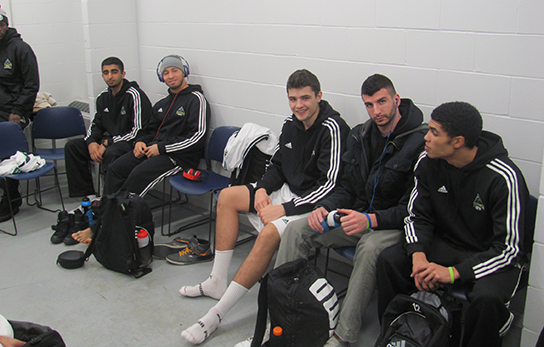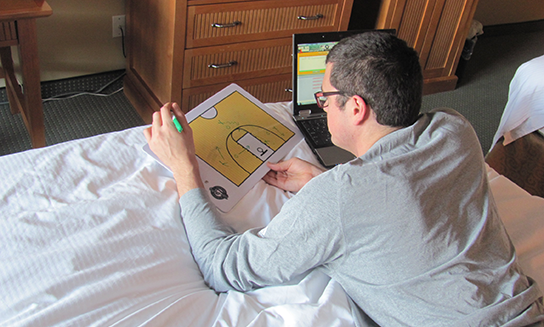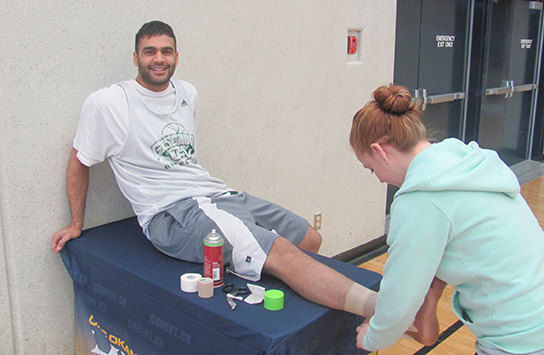Print Edition: February 6, 2013
“Don’t worry, you’ll just room with me,” says UFV men’s basketball head coach Adam Friesen as I stand awkwardly in the door of his office. He’s not joking, even though I’ve never heard of a head coach offering to share a room with a reporter.
“It would be an honour, coach,” I say, already praying I don’t mess it up. “I look forward to the male bonding.”
He gives me an opaque look and I remember that coach Friesen is serious. Serious about life, serious about basketball, serious about victory. His job is to lead his team to success on and off the court, and everything, from his jokes to his shoes, revolve around that goal. As the smooth-shooting son of controversial Yale Secondary basketball coach Al Friesen, he’s a legend in this city. At the moment, he’s coaching a team with only three returning players to top 10 in the country against all odds.
“The bus will be leaving Thursday at 6 p.m. or perhaps a little earlier,” Friesen says, and I nod my promise to be ready. He’s got practices to run and places to be, and I slip away to consider the fact that I’m going to be rooming with a CIS head coach.
The team is heading up to Kelowna for two nights to play a series against the UBC-O Heat, a second-year expansion team that’s been bumped up from the BC College league (BCAA). Last week the Heat pushed Canada’s number two ranked team, the UBC Thunderbirds to the edge in a one-point loss, and while the Cascades are eager to come away with two wins against the 2-14 bottom-feeders, the team knows it won’t be easy. Not everyone is healthy, and the team has just cut the services of second year guard Jordan Blackman. They need to win to stay a few games ahead of the surging TWU Spartans, and maintain third spot in the Pacific Conference.
On Thursday, I arrive in front of the EAC at 5:40 a.m. and then loiter in the lobby as players slowly emerge from the showers. Some shoot me searching looks; fifth-year guard James York sidles over and asks if I play the four or five position. I’m flattered, but I admit that I’m the reporter before anyone asks me to prove my game.
Guard Klaus Figueredo is eating a pulled pork sandwich out of Tupperware with a fork, and Kyle Grewal’s six-foot-six frame is sprawled across a nearby couch. The men’s and women’s teams often travel together, and players of both genders laugh and joke as we board the bus. Many of the women immediately pull out homework in anticipation of the three-and-a-half hour journey; most of the men simply slip on headphones or plead with the coaches to put on a movie.
“So I heard on the radio that gingers are going extinct,” says Cascades top scorer Sam Freeman to team trainer (and redhead) Tahira Larson, kicking off an animated conversation. Elsewhere, rookie Luke Morris is being teased for his “Mission swagga” by Grewal, even as the big man tries to persuade Morris to share his chocolate milk. “You gotta drink milk that’s the colour of your skin!” pleads Grewal, but he gleefully changes the subject as a logistical quirk forces Morris and the beautiful Sara Wierks to share a bench.
By the time we’ve reached Kelowna, raided the 7-11 for five cent candy and jalapeno taquitos, and settled into hotel rooms, it’s almost 11 p.m. I expect coach Friesen to want to settle into bed almost immediately, but the man surprises me with discussion about current events, the Newtown shooting and the GOP primaries. Eventually (perhaps inevitably) we shift to basketball, and Friesen explains how he took a team that over the summer lost former head coach Barnaby Craddock and starters Joel Friesen and Jasper Moedt, and kept them in the top 10 national rankings.
“A lot of teams [in the CIS] think summer is a vacation,” explained Friesen. “We practiced every day Monday to Thursday for the entire summer. If we had tried to come into September and figure it out then, we never would have had been as competitive as we are. This team understands how to play together.”
He and I discuss what makes a competitive team, and reminisce about our high school days in a town ruled by Mouat and MEI until Yale broke into the basketball scene seven years ago. Friesen admits that while he’s flattered by people’s assumption that the Cascades will take both games easily, he’s worried they underestimate the Heat. Without Grewal on the floor, he explains, his team starts three program rookies and gets more interesting from the bench with last year’s red shirt Nathan Kendall and “skater boy” Sean Ashkenazy.
Kyle Grewal is in his fifth and final year of eligibility, but he has actually been with the Cascades for seven years and spent two of them injured. Complications from an infected blister and sprained ankle on the same foot have kept him off the court since before Christmas, and the team has had to adjust to a smaller, faster game without him. How important is Grewal to the Cascades? According to Friesen, he is the best player the program has ever produced, and the heart and soul of the UFV team.
The next day, game day, becomes gradually more intense as the 8 p.m. tipoff approaches. In the morning the players are relaxed, laughing and bantering. Six-foot-seven redshirt Hudson Simon mishandles a hot potato question from the coach (How many suicides should a good team run per practise?) with an answer (At least five, coach!) that makes his teammates groan. “You’ve gotta negotiate, man,” I explain to him. “Start at three. Coach will answer eight. Work him down!”
Hudson nods, eager to please as only a 19-year old rookie can be. He takes a second ribbing after he assures coach Friesen that he could stop OKC star Kevin Durant “60 times out of 100,” but the teasing isn’t as harsh as it could be. Simon can touch the top of the square on the backboard, and specializes in a running hook that is almost unstoppable. With another year or two of work, his name is going to be nearly as famous as Grewal’s in the CIS.
They spend an hour in the afternoon in a relaxed “shoot around.” Friesen runs a few drills, and ends with a frantic three-pointer competition between the big men and the guards. Simon hits two in a row and air-balls the third. James York, point guard and team clown, talks an endless stream of trash as he bumps the big men’s ball across the gym and interferes with their pursuit. I’m laughing, the team is laughing, this is garbage ball at its finest.
After a team dinner, we bus back to UBC-O and head to the locker room. Most of the team are lost in their headphones, listening to an endless playlist of rap and hip-hop. A surprising number have Tahira Larson tape their ankles, after which she moves around the room tapping shoulders, fingers, hips and knees with questioning glances. It’s nearing the end of the season and everyone is being bothered by something. Guard Kevon Parchment has three layers of tape wrapped around his middle finger like the beginnings of mummification. Grewal, who isn’t playing, insists on having his ankle taped anyway.
Friesen has already given a speech on the bus. “Don’t take these guys lightly,” he urges. “UBC only beat them by one! You can’t afford to flick a switch half way through, you might not be able to. UBC-O has nothing to play for, their season is over. Yours isn’t.”
The Cascades win, barely. Surprisingly, Grewal plays four minutes and scores seven points, showing the Heat a taste of what UFV could be without the injuries. With three minutes left it looks like the team is going to lose, but a steal and a made foul shot from Klaus Figueredo sends it to overtime. Given a second chance to win, Nathan Kendall leads the Cascades to victory.
In the locker room, Parchment leads the team in a Victor Cruz inspired salsa celebration, while the coaches and I breathe a collective sigh of relief. Back at the hotel, Friesen will watch the entire game again twice on his laptop. He gets more frustrated each time, noting defensive breakdowns, missed exploitations on offence and the fouling patterns of his team.
“We couldn’t shoot threes and we couldn’t get to the rim,” he mutters finally. “How is it that a 2-14 team could stop one of the top 10 teams in Canada from shooting or driving?”
It’s a question I don’t feel qualified to answer.
The next day is a repeat of the first, except this time the team neglects to go to dinner together, and this time they trail by 10 at half-time. The Cascades, who have just set a program record by scoring only five points in the second quarter, have trouble articulating what’s wrong in the minutes before the coaches arrive in the locker room. Grewal speaks, his hoarse voice urgent with passion, and others, Ashkenazy and York, join in. The rhythm, the confidence is off. They know it, I know it, but their emotion gets the better of them.
In the second half I watch York disappear from the floor, while Freeman drives again and again and forces himself into awkward, low-percentage shots. On defence the zone begins to break down, and even the presence of Grewal can’t turn a stinker of a game around. They lose by 10, and this time there is no salsa.
The Cascades shower and trudge to the bus. On Twitter the UBC-O media is already triumphantly tweeting that men’s basketball has beaten a “ranked” team. It all feels unfair somehow, as if in our own gym we would have somehow beaten them easily.
It’s three-and-a-half hours back to Abbotsford, and this time my seat is near the front of the bus where the four coaches, two from each team, gather. They talk far into the night about what could have been, what should have been, the difficulty of managing referees and the peculiarity of the UBC-O Heat’s offence.
Friesen is intense, disappointed and yet still tugging at the problems, the enigmas of the loss. I know from my experience in our room that he will spend half of tomorrow watching the game over and over. It’s his job, it’s who he is: a great basketball coach first, everything else second.
Far behind me I hear Grewal laughing. He understands what all good players must understand if they wish to survive: how to learn, but also how to forget.





